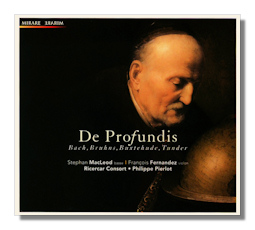
The Internet's Premier Classical Music Source
Related Links
-
J.C.F. Bach Reviews
Bruhns Reviews
Buxtehude Reviews - Latest Reviews
- More Reviews
-
By Composer
-
Collections
DVD & Blu-ray
Books
Concert Reviews
Articles/Interviews
Software
Audio
Search Amazon
Recommended Links
Site News
 CD Review
CD Review
De Profundis

- Johann Christoph Friedrich Bach: Wie bist du denn, o Gott
- Dietrich Becker:
- Pavan à 5
- Sonata à 3
- Nicolaus Bruhns:
- De profundis clamavi
- Der Herr hat seinen Stuhl im Himmel bereitet
- Dietrich Buxtehude: Ich bin eine Blume zu Saron, BuxWV 45
- Franz Tunder:
- Da mihi Domine
- O Jesu dulcissime
Stephan MacLeod, bass
Françoir Fernandez, violin & violino piccolo
Ricercar Consort/Philippe Pierlot
Mirare MIR041
De Profundis is an extremely well-performed and presented "recital" of seventeenth-century north German sacred music for bass voice and small consort. It demonstrates how the five composers, Johann Christoph Bach, Dietrich Becker, Nikolaus Bruhns, Dietrich Buxtehude and Franz Tunder, responded to many of the developments in musical and ecclesiastical thought a century or so after the Reformation: tension between the elaborate, the plain and pious; between the sparse and the Italianate; between the rich and ornate and that which emphasizes the meaning of the text above all else; and – significantly – the absence of any distinction between aria and recitative. The latter style suits bass Stephan MacLeod particularly well.
Further, he sings with conviction, a real presence and immediacy. Yet he also employs an appropriate reserve. Every syllable is clean and lucid, such that the text and its devotional thrust make maximum impact without ever being "over sold". The strength of the metaphorical exploration of the bounty of plants in Buxtehude's Ich bin eine Blume zu Saron from the Song of Songs [tr.7], for instance, is persuasive in the extreme: Macleod's phrasing and barely-perceptible anticipation of notes convey an ardor that both the Old Testament and Buxtehude must have intended. But nothing cloys or is intense for its own sake. He excels with some strikingly low notes – those mid way through Johann Christoph Bach's Wie bist du denn, o Gott [tr.8], for example.
The violin and violino piccolo of Françoir Fernandez are both unobtrusive and totally supporting. It's clear that he's delighted by the possibilities of the violino piccolo, which had a relatively short lifespan… it was first mentioned in 1596 but had disappeared by Mozart's day. Fernandez' approach is one that revels in the expressive richness of the strings; and in their ability to twist and turn to suit the pace and mood of the music. Again the Bach is a good example: spectacular passage work and dominant, rhetorical chords almost compete with the gentler line which the solo strings need to make. Fernandez has a special sense of presence, melancholy and affirmation throughout the CD.
Conductor Philippe Pierlot has an unambiguous and informed vision of the beauty and importance of this lovely repertoire. He elicits from soloists and the ever-inspiring Ricercar Consort a sumptuous flow of depth, color and penetrating sonority. It is hard to miss (and not be uplifted by) the extent to which the instruments go beyond "accompaniment" and add voice and line to the melodic development almost throughout. Pierlot contributed to the highly illuminating booklet that comes with this CD. One has the sense that everyone involved wants to make a sensitive yet unambiguous case for this music. And rightly so. It can be a neglected area of the early Baroque; it requires a delicacy of approach for listeners new to the music to see past the more familiar names of Buxtehude and J.S. Bach's uncle, to the softly intense sound world of Tunder, Becker and Bruhns.
The great strength of this recording is that the musicians have justifiably raised our expectations (anticipated, perhaps, in the design of the "digipak", for instance) of music which is almost proto-Romantic, brooding, excessively introspective, almost trapped in its own melancholy as is much of the painting of the era… the ravages of the Thirty Years War dominated everyone's lives in the north Germany of the time. And indeed those musicians have delivered the intensity and emotional vehemence at which these five composers so excelled.
Yet without a note of self-consciousness. They have each brought to their thoughtful and penetrating interpretations a rigor and discipline that must have infused contemporary performances. Not so much an urgency, although life was felt to be short and precious, for that would have smacked of fanaticism. Rather, a relaxed and highly professional concentration on the relationship between text and music. A joy in the melody and timbres which is actively and spontaneously supported by a certain appropriate latitude with tempi.
As a "calling card" for the music of the era and location this CD could hardly be bettered. If its gorgeous performances don't persuade you to seek out further compositions by Bruhns and Becker in particular, then probably nothing else will. The acoustic is subdued without being dead. The overall sense is of very special music played at its best for an audience who barely needs to be convinced of its power and worth. Yet nothing is taken for granted – because every phrase is treasured. Surely how those who wrote it intended. Very warmly recommended.
Copyright © 2009, Mark Sealey




















